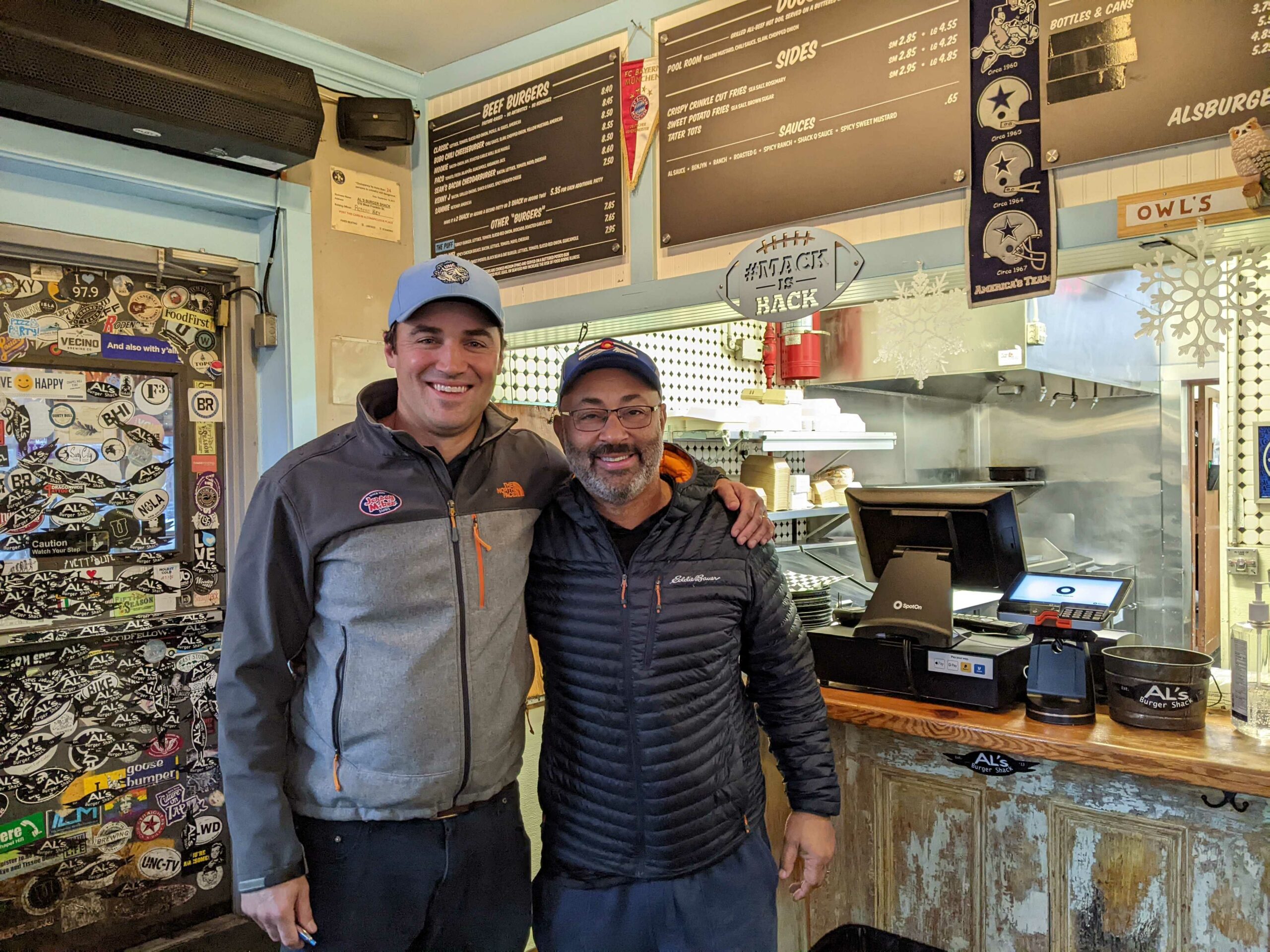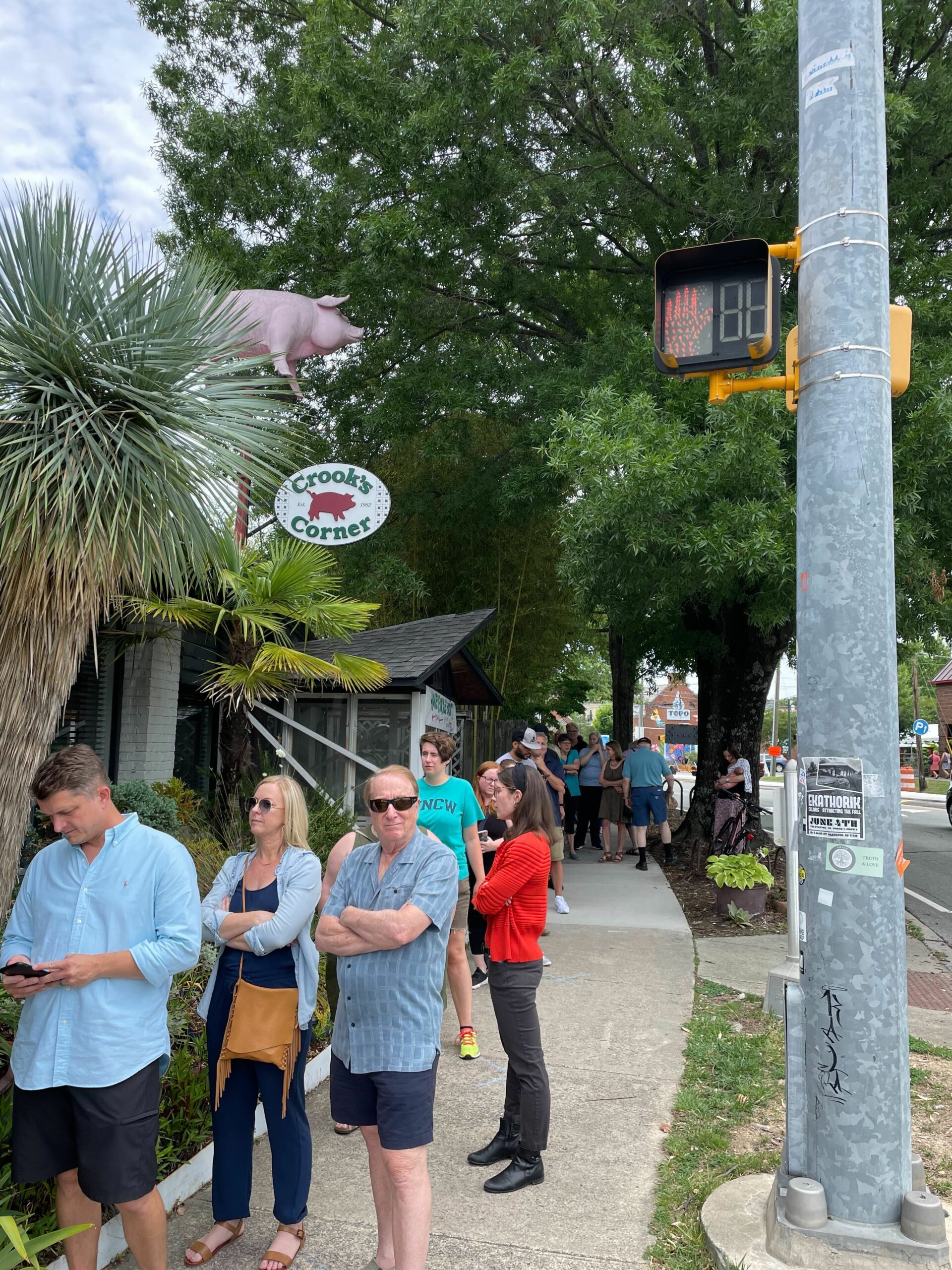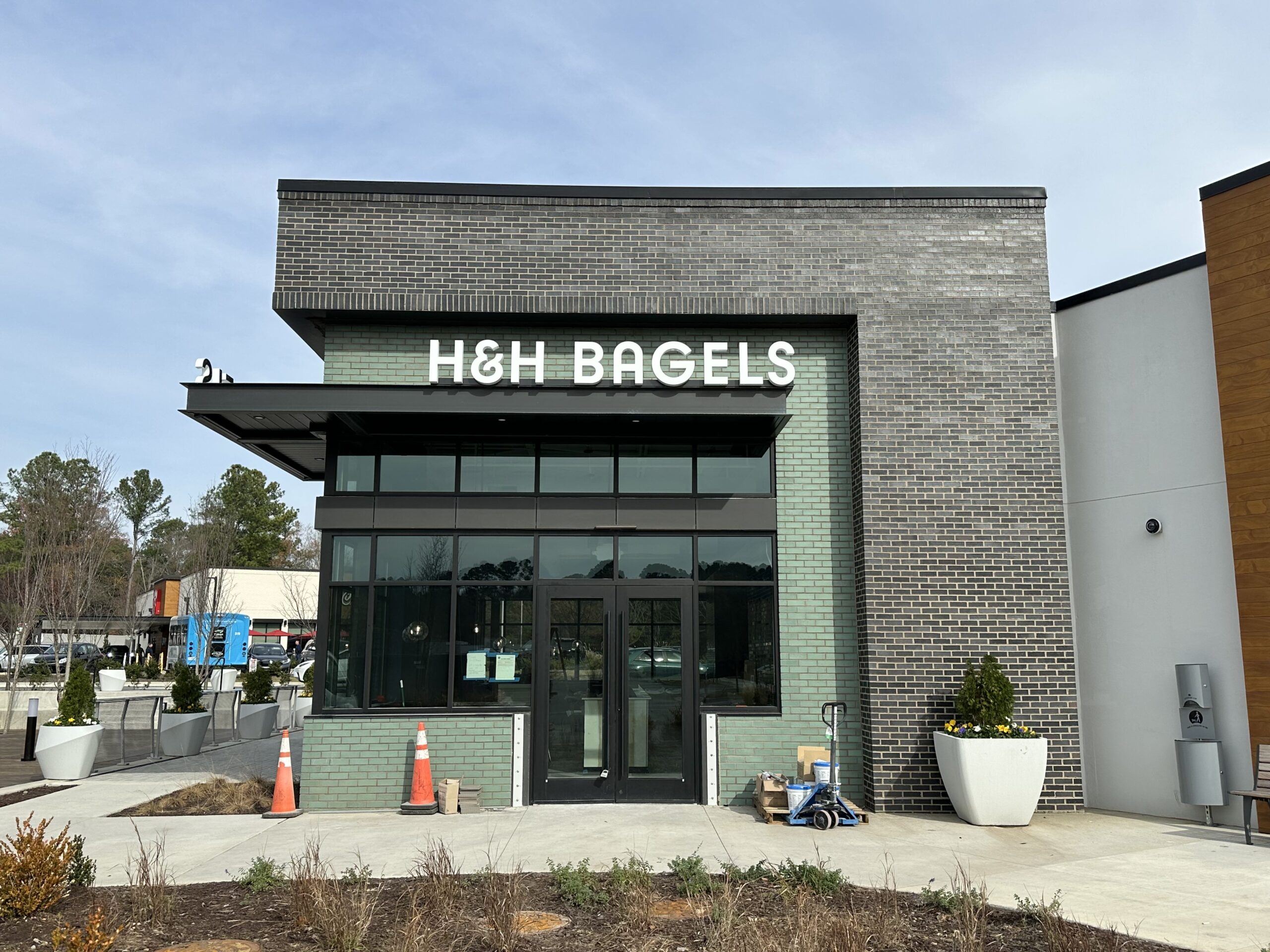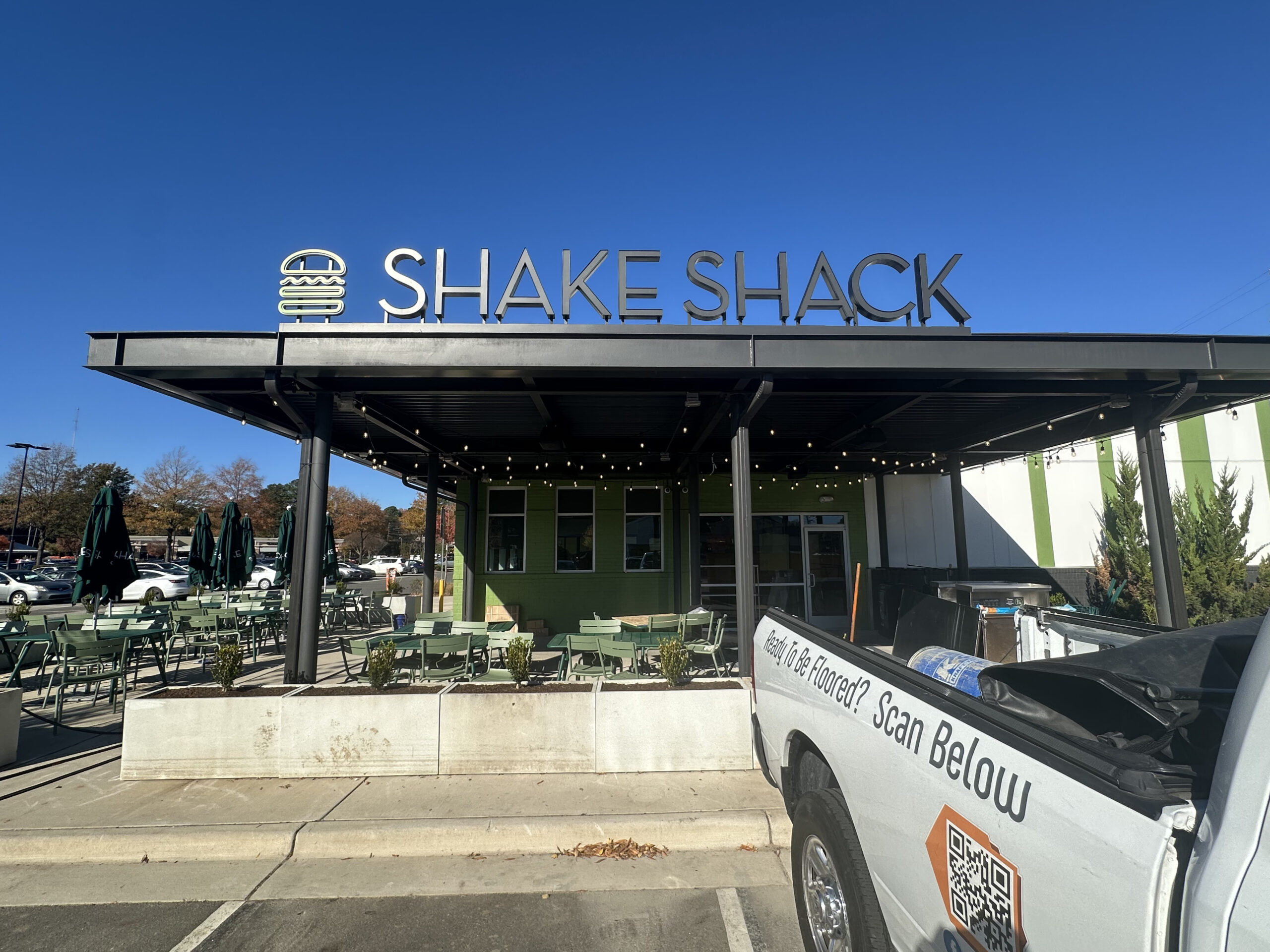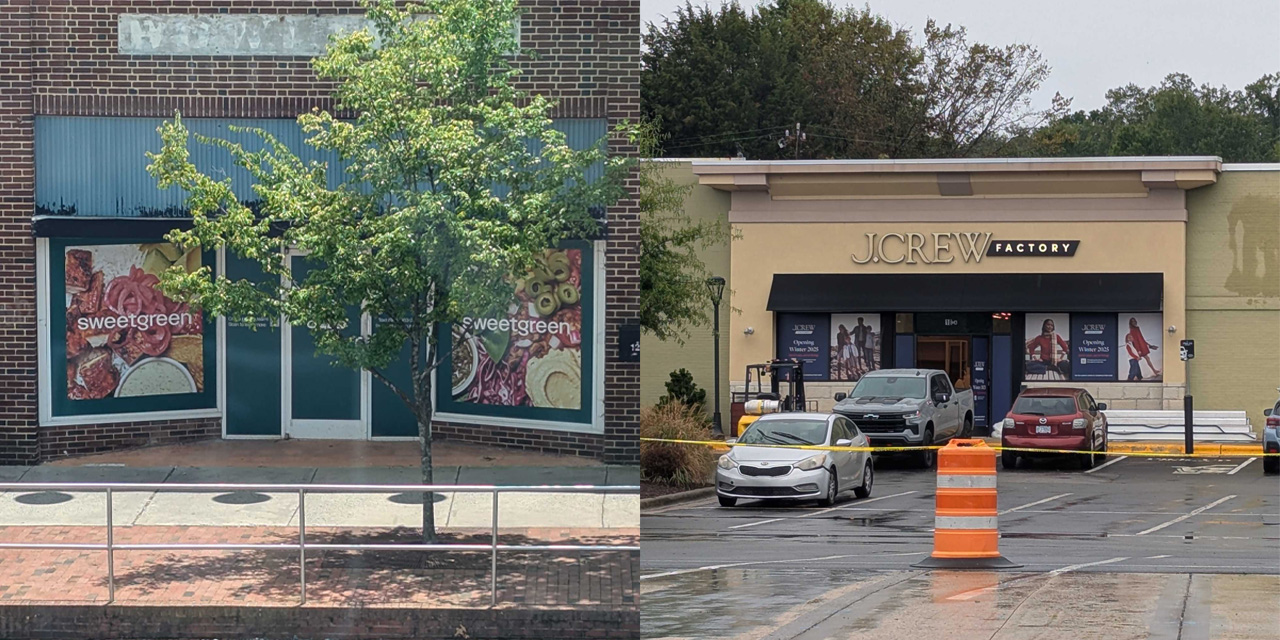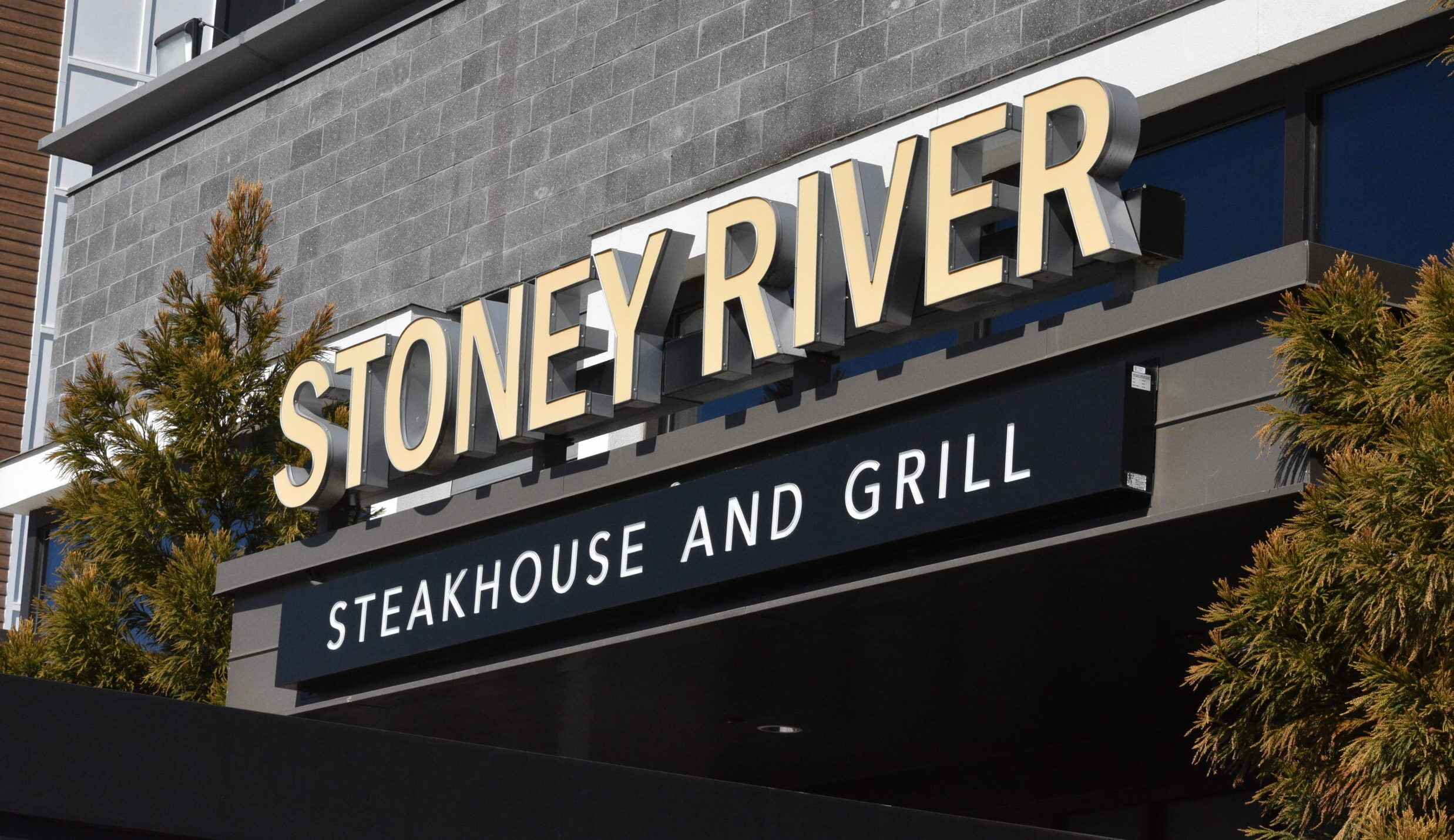
From left to right: Chad Pickens and Chuck Millsaps of the Great Outdoors Provision Company, Amal Zonca of Waxing The City, Meri Clark of Restore Wellness, Andrew Stuckey of 97.9 The Hill and Elie Abou-Rjeileh of Olmaz Jewlers pose after their special forum on Chantal’s floods and the ongoing recovery for Eastgate Crossing tenants. (Photo via the Chapel Hill Media Group.)
More than three weeks removed from the damaging flooding caused by Tropical Depression Chantal’s rainfall, the conversation in many of central North Carolina’s affected communities has shifted from emergency response to recovery planning and remediation. For tenants at the Eastgate Crossing shopping center in Chapel Hill, that includes the challenges of overhauling their flooded interiors while determining the long-term risks of operating in the flood-prone area.
On Friday, July 25, a group of Eastgate Crossing merchants joined 97.9 The Hill Andrew Stuckey on the air to share what their ongoing rebuilds are costing, navigating discussions with their landlords and insurance companies, and weighing when — and whether — to reopen. Highlights from Great Outdoors Provision Co. President Chuck Millsaps, Waxing The City Franchise Owner Amal Zonca, Restore Hyper Wellness Franchise Owner Meri Clark and Olmaz Jewelers Co-owner Elie Abou-Rjeileh are below, with some parts lightly edited for clarity and contextualized by topic from the original interview.
On the Economic Impact to Their Business
Amal Zonca: In terms of how we’re going to pay for it, it is going to be all out of pocket. And at this time of year, this is our highest season in terms of hair removal. It’s summertime, we’re coming up to Labor Day, and usually we tend to see a slowdown after [then]. Unfortunately, we are closed, so we’re missing [out] on that income. We’re also missing on the reoccurring income from like memberships that we get from clients. I estimate the damages for Waxing The City to be about $200,000. We’re barely going to get 20% of that from insurance reimbursement. So, the remainder of that is going to be all out of pocket.
Meri Clark: Yeah, a lot of it will be out of pocket [for Restore]. I’ve reached out to Carolina Small Business Development Fund, and they’re a resource for all of us in the local community to talk to about SBA loans. We’re still waiting to hear if we’re going to get a federal declaration of disaster, which will help give us access to other loans at better rates. But until then, we’re all looking at ways to get loans lines of credit, because a lot of this is going to get funded from our pockets.
Chuck Millsaps: Our situation in Great Outdoor Provision is very similar to our colleagues’ here. As a local business, we’ll have to fund this rebuild. And, it also comes at a time [approaching] the fourth quarter where a lot of our financial resources are being used to get inventory, hire staff and be ready. So…this is quite a challenge.
Elie Abou-Rjeileh: Most of us are worried about our fourth quarter. It’s a very important quarter for us, especially in retail. I would love it if [Olmaz’s temporary location] was open by the end of August. To me, if [it was] even early October, that would prepare us for the holiday season. And while we’re in the temporary space, we can still operate and have our employees there…but there’s no reassurance [of a return to normalcy.]
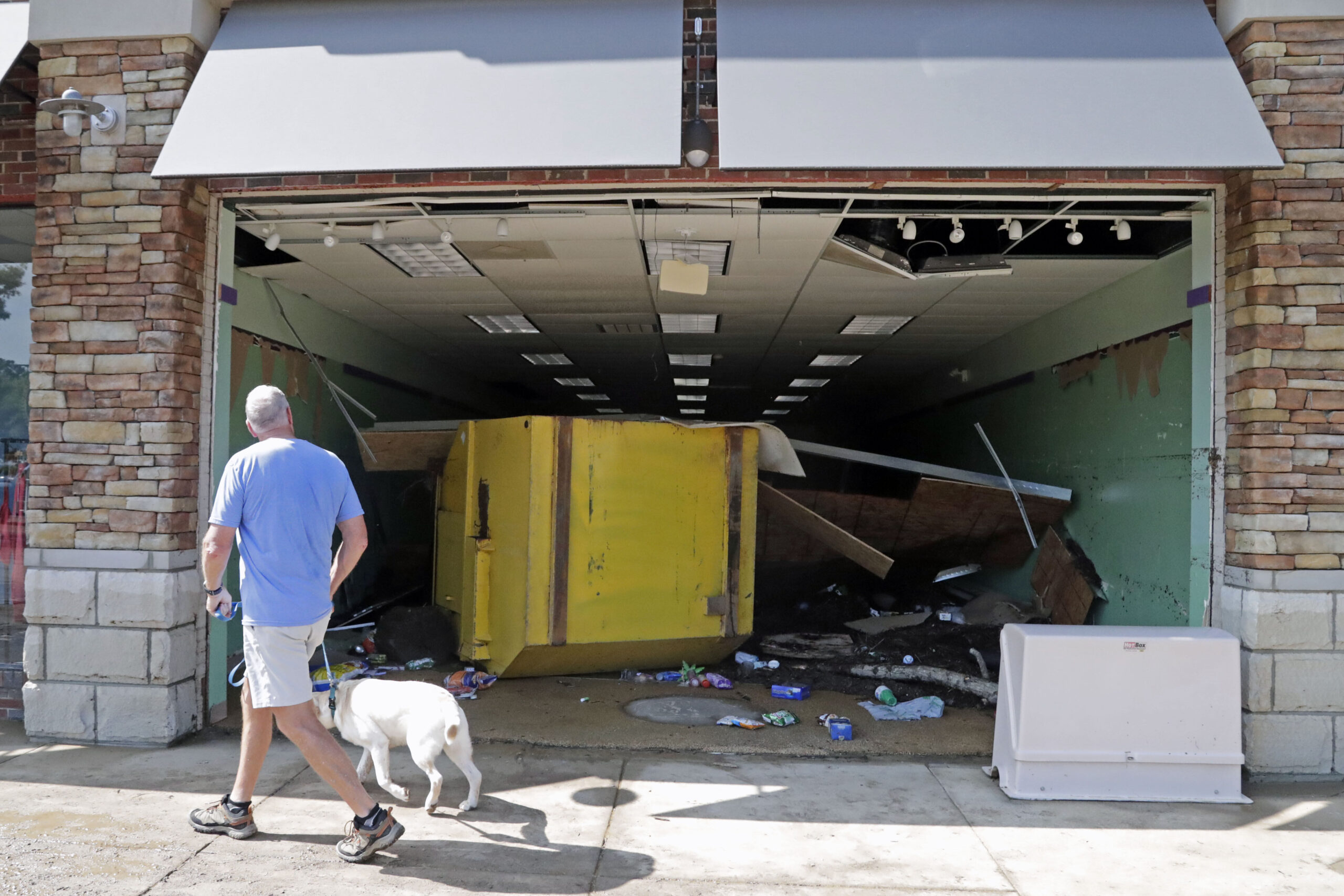
A walker and his dog survey a floating garbage container that crashed through the front of this business in the Eastgate Shopping Center after it was flooded during Tropical Depression Chantal. (Photo via AP Photo/Chris Seward.)
On the Impact to Their Staff
Amal Zonca: At Waxing The City, we have 12 employees. We have the best team. It’s incredibly hard to hire people, train them, and retain them. Right now, we still have them employed [and working] out of our West Cary location and we’re doing everything we can so we can keep them with us. [But] these employees, they have a longer commute to go from where they live to West Cary versus where they live to Chapel Hill. That’s really a challenge, [and] that’s why we’re doing everything we can to really open back up very soon.
Meri Clark: I — unfortunately — lost my general manager for the studio. I was able to re-home employees at my Durham or Raleigh locations… but given the distance from where she lives, she did find something else very quickly. I’m very happy for her, she was a great manager. [But] I made a huge investment in her to find her. So, I am really starting from zero when I reopen. I don’t have any staff right now. And also, like Amal, I am membership based. Every day that we’re not open, people are getting out of their routines, they’re finding competitors to go to. That’s a huge concern of mine too, is having to restart from zero [with customers]. We’re doing pop-ups, like a popup for the next two weeks at Chapel Hill Country Club to try and keep some members engaged. A lot of members are going over to the Durham location, but there’s still probably a good 70% that haven’t [showed back up].
On the Challenges Around Flood Insurance and What is Covered
Amal Zonca: We really don’t know what we’re going to do and, of course, we cannot get any assurances that this [flooding] is not going to happen again. We absolutely need to be looking at remediation plans, [and] floodgates is number one. I think floodgates could have absolutely — if they were up — could have helped [limit] the amount of water inside the space. In this instance, we did not have our flood gates up. In 2018 [during Hurricane Florence], we did have the floodgates up and our space got less than a foot of water, which was really quick remediation.
In terms of insurance, I already started having those conversations with the insurance company. I’ve gotten two responses so far. They’re saying that they are not going to be able to change my coverage, of course, because the space is not operational right now. But then even after we open, we’re not going to be able to increase coverage just because we are in a flood zone. And this is the second time that it’s been flooded, you know?
Elie Abou-Rjeileh: Just like Amal, I reach out to my insurance company just to start the conversation about flood insurance because I have a flood insurance and a couple of questions that I asked. ‘How do I know I’m going to get coverage? How much my coverage is gonna be after all that we’ve went through here in Eastgate?’ And we cannot start the conversation until we build the store back up. Then they can look into the [space] and assess it from there. So, [insurers] can’t give us any guarantees right now what the situation is going to be like with flood insurance after we’re open, [like] if the price is gonna go up, if we can get extra coverage or if we can get coverage at all. That all has to be after the rebuild. And so [building back like it was before] is kind of taking a risk there.
Zonca: I think the biggest help and support we could get from the landlord [Kite Realty] in this time is they have to help us get like flood insurance coverage. Because my [insurance] company already started saying that they don’t think they can cover me anymore after this flood, because we pretty much lost everything. And I’m not sure what the conversations are for the other tenants, but we have to get the landlord help us secure a flood coverage — because it’s in our lease that we have to have flood policy. But if we cannot get a policy, then 1) we’re already in violation of the lease. And 2) if it happens again, then we’re immediately going to have to shut down. We cannot keep spending the money on rebuilding after every storm.
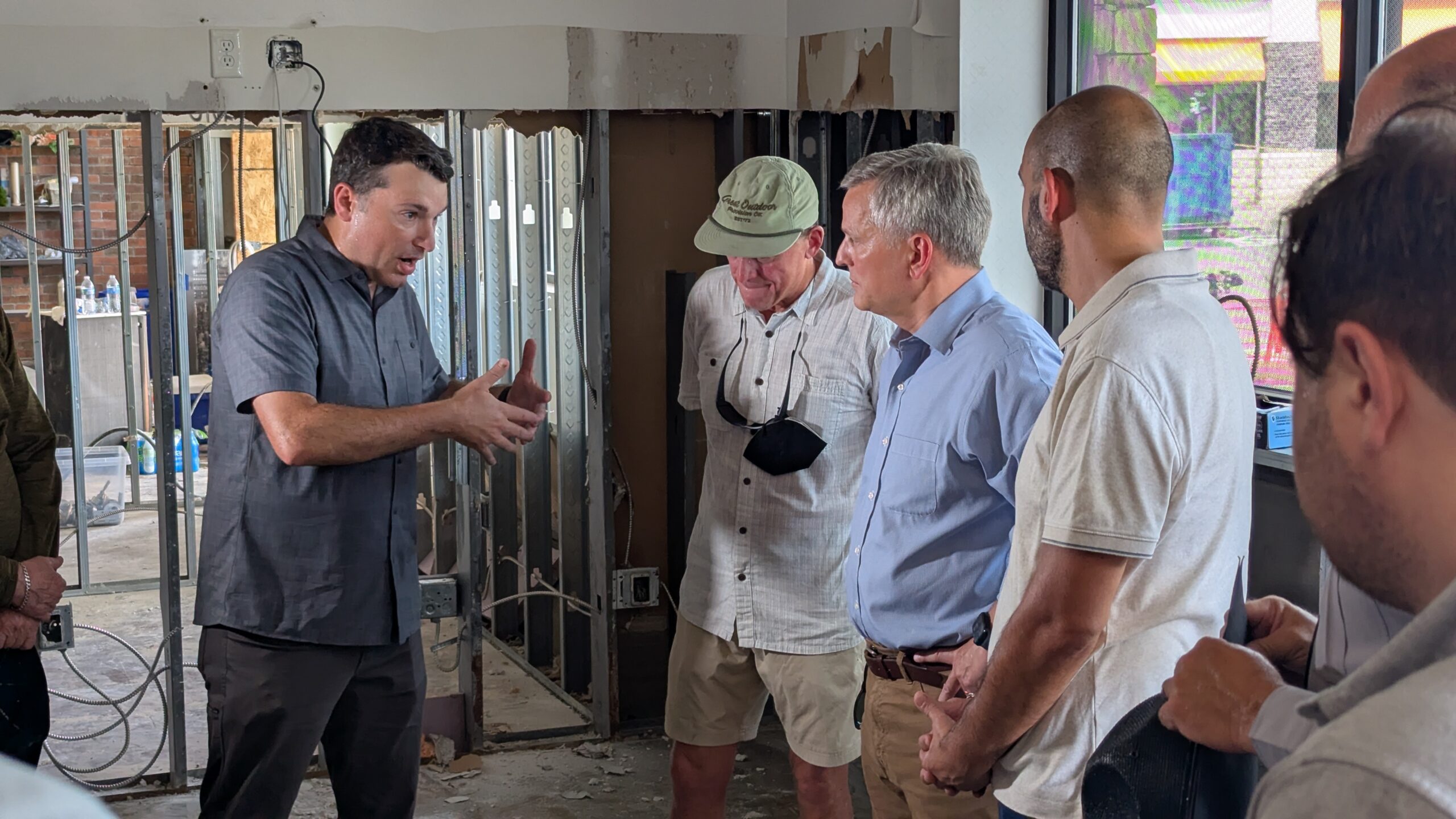
(From left to right) Great Outdoors Provision Co. Manager Chad Pickens speaks with Chuck Millsaps, North Carolina Gov. Josh Stein and Elie Abou-Rjeileh of Olmaz Jewelers in Olmaz’s damaged space on Friday, July 18. (Photo by Brighton McConnell/Chapel Hill Media Group.)
On Whether They Will Rebuild in Eastgate
Amal Zonca: We’re still questioning that. Let’s say the big businesses are gonna be opening way sooner than the small guys like us. So, when those open, we’re still gonna be closed. I’m still assessing if Eastgate is the right location because we’re talking about rebuilding and all the expenses coming out of pocket…but what’s next? What about if we get hit with the other storm? So the landlord needs to sit with us and just tell us what are the next steps to avoid this next time that [flooding] happens.
Elie Abou-Rjeileh: In those conversations with the landlord, like Amal is saying, and there’s no reassurance or straight answer. It’s always, “Let’s worry about rebuilding now and then we’ll worry about how to fix Eastgate later.” Unfortunately, some of us are in a long-term lease. We don’t want to go into litigation, we can’t afford litigation, so we have to stay in Eastgate and try to literally rebuild. It’s gonna be probably the least expensive for a lot of us to stay in Eastgate, building-wise, because we’re offered — based on our lease — a white box or an empty shell office store. And then we can put our furniture and fixture in there. But still…there’s gonna be a lot of money out of pocket because of that. So, it’s all going to be added loans to what [costs] we already have when we started our business.
We’re looking at all of our options. To us at Olmaz, our most important thing is keeping our four full-time employees. We’ve been operating from a location close by and trying to move to a temporary one until we figure out when is Eastgate gonna be rebuilt.
Meri Clark: When I first signed my lease, [Kite Realty] had said, “This is what we’re doing to mitigate this problem. And they have engineers coming out quarterly, they cleaned out the culvert. A lot of work had been done.” So, you kind of felt a little bit safer. But this [flooding] was incredible. Going into my store, the water was over my head. I’m 5-foot-5, it was over my head…just complete destruction. So I, like Elie, have a longer lease and there’s not a lot of flexibility there. And so, it’s scary to invest more money and rebuild [when we do not know] what’s flood insurance gonna look like moving forward for us.
Chuck Millsaps: At a minimal level, we would very much like to have a temporary way to serve our customers here in Chapel Hill as we have better understanding of what the next version of our service level could be. I mean…it starts as basic as [having] a door, right? Our doors were blown off the front. We have plywood [up at the] front. So, first, making a safe environment for our staff, giving them confidence of working within [that space will be critical to prove that] Eastgate is going to be a safe and enjoyable experience. It’s also critical that our customers have clear communications on what they’re walking into. It could be a concrete floor, which we have now — but it can’t be the concrete floor we have right now because that is not ADA compliant.
Beyond that, it is our neighbors — the great tenant mix, like my colleagues here with you today. We’re in a sports town, right? And it’s coming up on football season, and there’s always talk about who’s gonna be the returning players, who do we lose, how’s the team gonna come back together… The strength of the team is made up so much of individual superstars, like these folks. So that too is very, very important for us: to know who will be able to open back with us.
On How To Support Impacted Businesses Moving Forward
Elie Abou-Rjeileh: Be there after we open. Support Eastgate — every tenant, not just small business, big business. Let’s bring it back to what used to be. I want to hear clients complaining about not finding parking spots…because that was our biggest issue at Eastgate, not finding parking. And I hope that would still be the big issue that we have at Eastgate [in the future.]
Amal Zonca: The holidays are coming up. There’s an outstanding mix [of businesses] in the shopping center, so when you’re thinking about buying gifts…just come and get gift cards from different stores. I think that would be one of the best ways to support us.
Editor’s Note: 97.9 The Hill and Chapelboro.com contacted Kite Realty to include the Eastgate Crossing commercial realtor in the programming. No response was received.
Chapelboro.com does not charge subscription fees, and you can directly support our efforts in local journalism here. Want more of what you see on Chapelboro? Let us bring free local news and community information to you by signing up for our newsletter.

